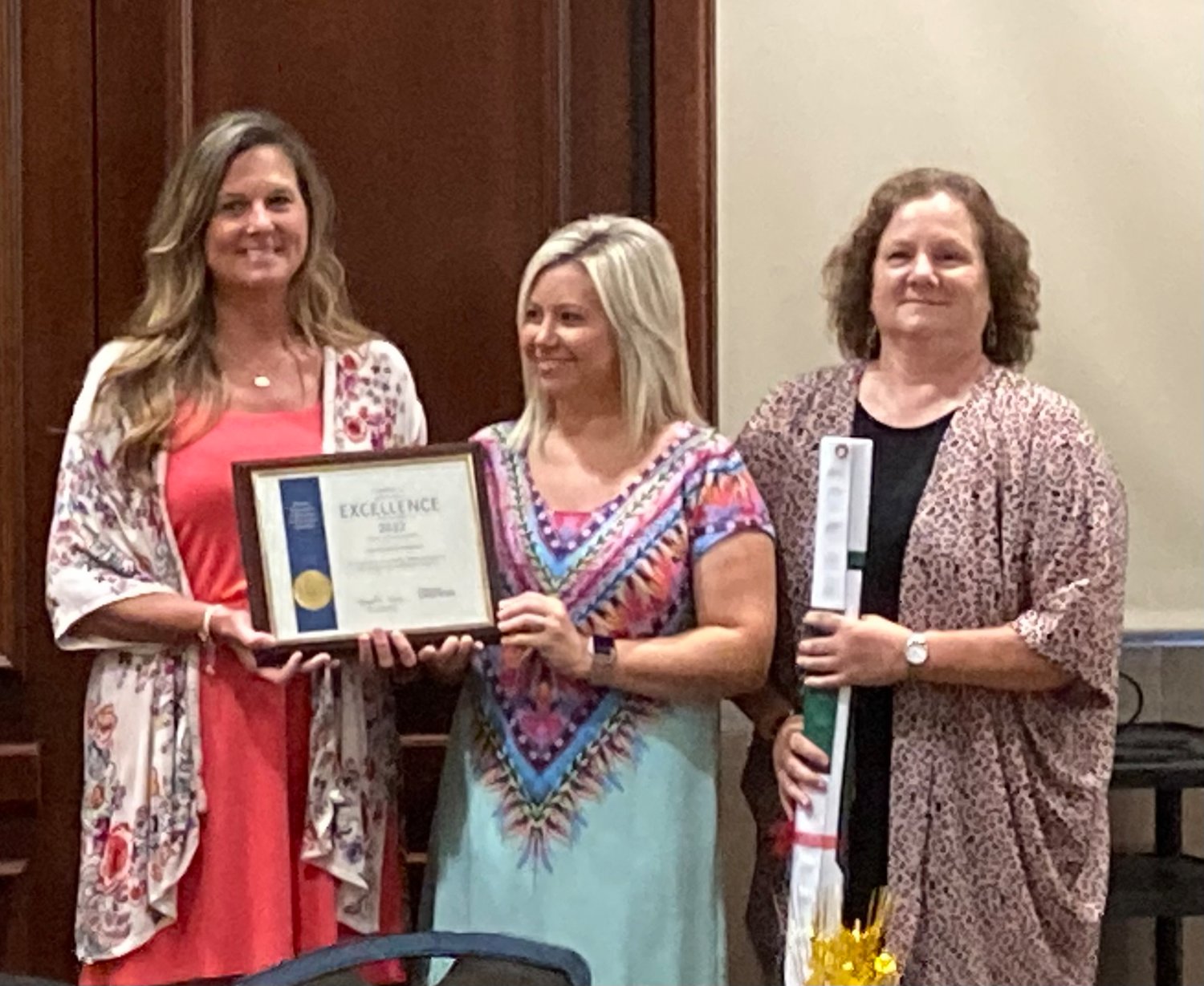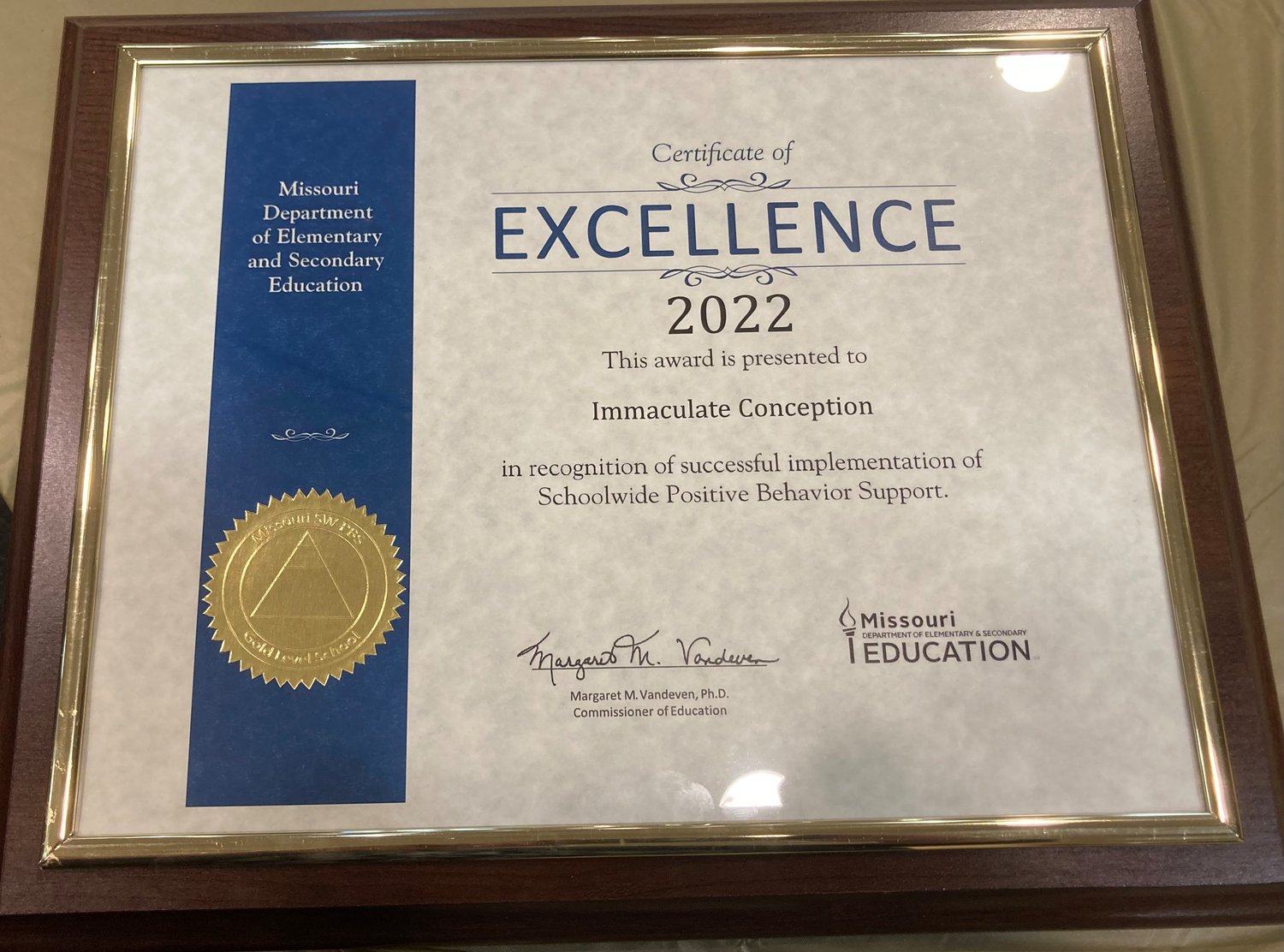I.C. School in J.C. gets Gold-Level Recognition for Positive Behavior Support
First non-public school in Missouri to receive organization’s highest honor

Immaculate Conception School in Jefferson City has set a new gold standard for reinforcing positive behavior among all of its students.
It recently became the first non-public school in Missouri to achieve Gold-Level Recognition from Missouri School-wide Positive Behavior Support (MO SW-PBS).
“School-wide Positive Behavior Support is a framework for creating safe and orderly learning environments in schools while improving the social-emotional outcomes for students,” according to the organization’s website (pbismissouri.org).
Rooted in research and best practices, it focuses on developing clear expectations for behavior, consistently reinforcing those expectations at all grade levels, and compiling systematic data to help address problems.
“I’m not gonna’ lie: we’re pretty excited about it!” said Heather Schrimpf, principal of Immaculate Conception School.
The school will enter its 11th year of implementing the program this fall.
“We have seen a large decline in our discipline issues,” Mrs. Schrimpf noted. “Our office referrals have decreased immensely and it really has created a positive learning environment in the school and a positive work environment, too.”
The program offers a framework that schools tailor to their own needs.
Each participating school begins by identifying between three and five behavior objectives for their students.
I.C. School chose the acronym “H.A.L.O.,” which stands for Having responsibility, Acting safely, Living Christ-like, and Offering respect.
All four of those behaviors, known as pillars, have their own set of expectations for every setting in the school.
“So we teach these expectations in the classroom, the hallways, the cafeteria, the playground and the church,” said Mrs. Schrimpf.
“The Living Christ-like piece is part of how we make it uniquely Catholic,” she noted. “Everything we do has a God aspect to it, and our matrix of behaviors that we teach has all of our expectations in it.”
I.C. students in all grade levels receive a thorough introduction or review of the H.A.L.O pillars and associated expectations during the first week of each school year.
“We do this so everyone is on the same page of what we expect here at school,” said Mrs. Schrimpf.
If any older students object to reviewing expectations they’ve already committed to memory, she tells them that everyone could use a reminder and that there are usually new students in their grade each year.
“So why don’t you help the new students see what we mean when we teach these pillars?” she suggests to them.
The road to gold
Achieving Gold-Level Recognition means that a school has completed the requirements for all three tiers of implementing School-wide Positive Behavior Support.
“Tier 1 deals with the majority of your students,” Mrs. Schrimpf noted. “It’s the reward side of things.”
It involves teaching the expectations, acknowledging good behavior and providing consistent support for preventing unwanted behaviors.
“This is basically the foundation of the whole thing,” she said.
Tier 2 involves a team of teachers and staff working together to provide additional support for students who are not as successful or are at risk of developing problem behaviors.
“On that team, we have a teacher from each department, the principal, our school counselor and our two special-education teachers,” said Mrs. Schrimpf.
The team meets twice each month during the school year to look at the data and to determine whether individual students need additional academic or behavioral support.
“That could be in the form of a simple check-in/check-out system with a teacher and a student,” Mrs. Schrimpf noted. “We would monitor the student’s progress and keep track of it.”
It could also involve having groups of students who have difficulty working with each other, meet regularly in a group with a school counselor to help them develop better social skills.
After-school tutoring is also an option for some students.
“That’s where our parish has gotten involved, and it’s awesome,” said Mrs. Schrimpf. “We’ve had parishioners volunteer to help students get their homework completed, review math facts and things like that.”
Tier 2 also involves reviewing students’ attendance, health-room visits, grades and behaviors.
I.C. School adopted the Tier 3 systems this past school year.
“Tier 3 accounts for roughly 1 to 3 percent of the student population,” said Mrs. Schrimpf. “These are children for whom all of the interventions and accommodations in Tier 2 have not been successful.”
It involves working with parents, teachers, possibly a student’s pediatrician and maybe an outside professional counselor.
Big investment
This program gives teachers and staff straightforward directives for addressing unwanted behaviors and helping to keep them from escalating.
“It gives teachers a clear policy for what needs to be handled in the classroom and what needs to be handled by a member of the administration,” said Mrs. Schrimpf.
It also includes a process for gathering and analyzing data for each grade level, such as where and when behavior problems tend to take place.
“We give a report to the teachers at each grade level, along with information about interventions that have been successful,” said Mrs. Schrimpf.
Missouri School-wide Positive Behavior Support is a product of collaboration between the Missouri Department of Elementary and Secondary Education, the University of Missouri Center for School-wide Positive Behavior Support and the Missouri Regional Professional Development Centers.
Representatives of I.C. School and Dr. Erin Vader Ph.D., diocesan superintendent of Catholic Schools, accepted the recognition at a June 14 award ceremony in Columbia.
She said implementing School-wide Positive Behavior Support is a lot of work, especially in the first few years.
She said it’s definitely worth the extra effort.
“A lot of it has to do with having conversations with the students and developing positive relationships,” she stated.
Comments
Other items that may interest you
Services
The Catholic
Missourian
2207 W. Main St.
Jefferson City MO 65109-0914
(573) 635-9127
editor@diojeffcity.org







